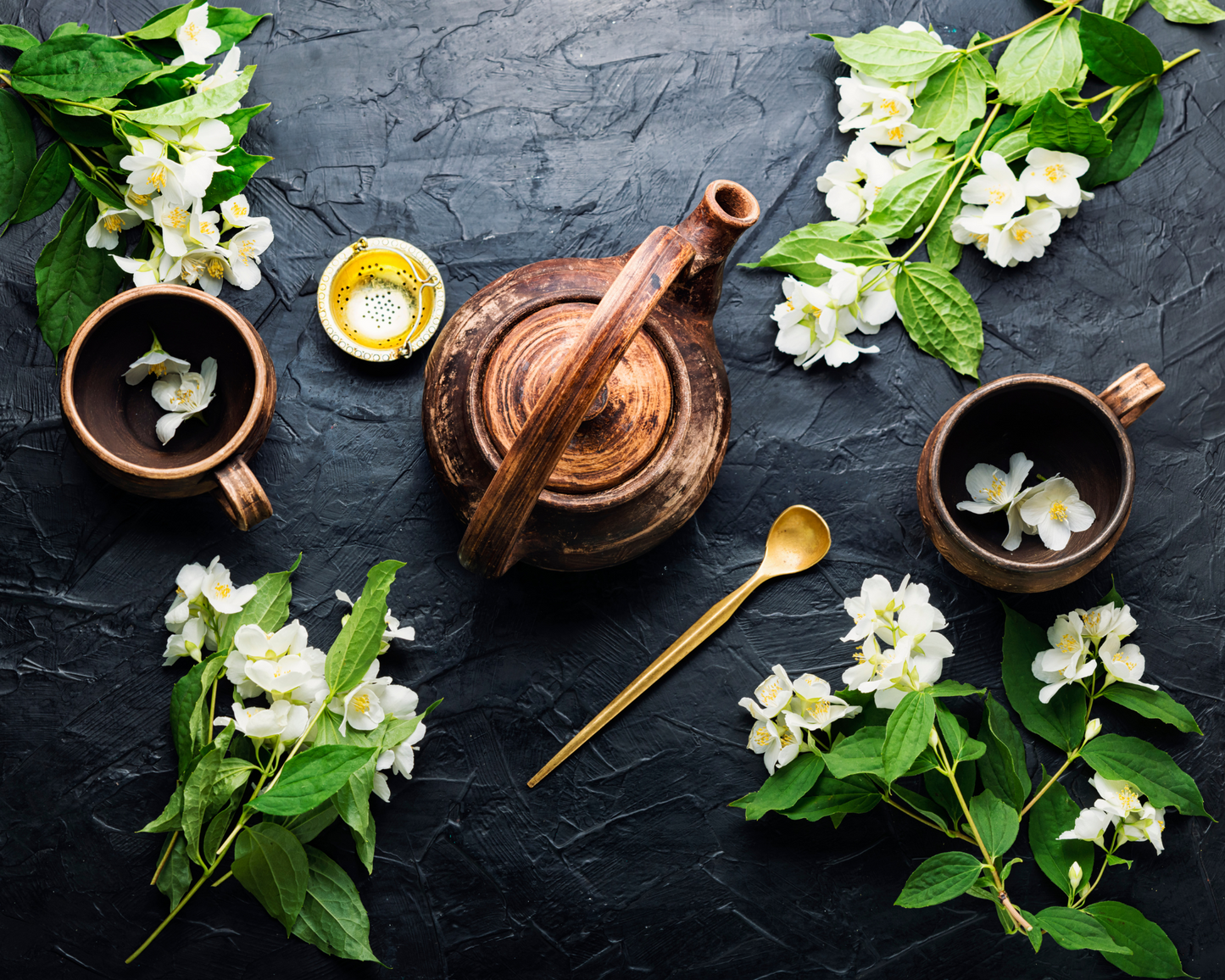
Pleasing in aroma and taste, jasmine tea isn’t just a delightful beverage; it may help prevent against a variety of severe illnesses ranging from heart disease to cancer. Thanks to high concentrations of antioxidants, jasmine tea can also help promote beautiful, healthy skin and boost your immune system. Read on to learn more about why jasmine tea is so good for the mind and body.
What is jasmine tea?
With roots tracing back to the Chinese Tang Dynasty (618-907), jasmine tea is a scented tea that is typically based on green tea, though black or white tea is sometimes used instead.
To make jasmine tea, growers layer green tea leaves with the blossoms from the jasmine plant. They remove and replace the flowers every 24 hours until their fragrance infuses the tea leaves, typically for about three days. The jasmine flowers effuse a deeply aromatic smell with a sweet finish.
Jasmine tea can be prepared a number of ways, but one of the most popular forms it takes is jasmine pearls, in which the scented tea leaves are rolled into small balls. These gem-like pearls unfurl as the tea steeps, creating a beautiful – not to mention aromatic – presentation.
Is jasmine tea healthy?
Although the scent of jasmine adds another dimension to the tea-drinking experience, most health benefits of jasmine tea come from the actual tea leaves themselves.
The health qualities offered by jasmine tea may vary slightly depending on the specific tea base used. But, in general, jasmine tea offers a whole host of health benefits including those below.
It can help boost your mood.
Anyone who has had the opportunity to enjoy a cup of just-brewed jasmine tea knows well of its perfumed aroma that at once relaxes the mind.
This is because our mood depends largely on the state of our senses and jasmine tea works directly on two of them – smell and taste – to elevate our mood and increase relaxation.
Studies have shown the olfactory (or smell) senses in particular have a powerful connection to relaxation. The enchanting aroma of jasmine tea can initiate a parasympathetic response, which releases chemicals that allow the body to relax and unwind.
Additionally, the sweet flavors of jasmine induce a relaxed state while the fresh finish adds an invigorating essence that can lift your mood after a long day. By drinking jasmine tea for stress relief, you're also able to take a few moments to refocus and relax. (For even more mood-boosting effects, consider practicing tea meditation with a cup of jasmine tea.)
It provides an energy boost – without the caffeine crash.
As jasmine tea uses a true tea (leaves from the Camellia sinensis plant such as green, black or white tea) as its base, it naturally contains caffeine. The caffeine content of jasmine tea can thus vary depending on which true tea is used to make it.
Green tea is generally the most commonly used. A cup of green tea contains around 35 milligrams of caffeine (compared to the 95 milligrams in a cup of coffee). True tea also contains the amino acid L-theanine, which helps to counteract the negative effects of caffeine. In other words, you still get the extra energy boost and improved focus, without the crash and jitters typically found in caffeinated beverages.
It promotes healthy, beautiful skin.
The essential oils derived from jasmine blossoms have antibacterial properties and antioxidants that can help keep skin looking its absolute best.
While jasmine oils have long been used topically on skin to heal wounds and scars, drinking jasmine tea can also help to slow the aging process by eliminating free radicals that can lead to wrinkles and skin damage. Tea’s polyphenols might even help to even out skin pigmentation and minimize fine lines.
To reap the skin health benefits of jasmine tea, consume two to three cups per day. You might also consider making a facial scrub or toning mist with your spent jasmine tea leaves.
It may lower your risk of cancer.
Free radicals are caused by pollutants in our environment and the food we eat, and can cause mutations in cells that have been linked to neurological diseases and cancer.
Although the topic needs more research, jasmine tea contains high levels of antioxidants (such as epigallocatechin gallate) that have been shown to help to eliminate these free radicals in the body, and thus prevent cancer.
It boasts cancer-fighting capabilities.
Jasmine tea’s polyphenols – or micronutrients that we get through certain plant-based foods – have also been studied to inhibit cell proliferation and in turn slow down rapid progression of mutated cells, such as those that are associated with cancer.
One study showed that green tea extract may slow the progress of chronic lymphocytic leukemia (CLL), a type of cancer that affects blood and bone marrow. Some researchers believe that the use of green tea extract might allow those with this type of cancer to delay more aggressive treatments such as chemotherapy.
It could lower your risk of heart disease.
A number of studies have shown that the same antioxidants in jasmine tea that help to prevent cancer can also reduce your risk of heart disease, including heart attack and stroke.
Other research has shown that catechins – a type of antioxidant – found in jasmine tea can lower LDL (or “bad”) cholesterol oxidation that leads to the inflammation of arteries and veins.
It may aid with weight loss.
Green tea has been studied to potentially help in weight loss by speeding up metabolism. A faster metabolism means your body can process nutrients and macronutrients (like fat and protein) quicker, leading to weight loss.
Although more research is needed to truly understand the effect of green tea on weight loss, there’s no denying that jasmine tea is a naturally low-calorie (and delicious) beverage which is a much healthier alternative to sugary drinks. Avoid adding sugar, honey or milk to your tea; these can quickly add to your caloric and sugar intake.
